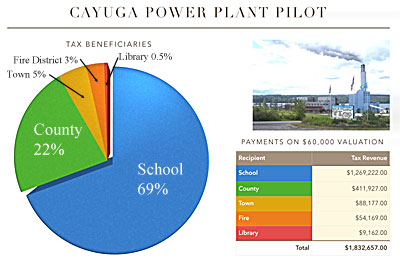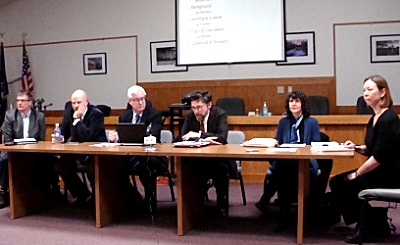- By Dan Veaner
- News
 Print
Print  In 2009 the agreement between Tompkins County and the Cayuga Power Plant established a value of $160 million and promised the plant would be valued at $255 million by 2013. Today that value is set at $60 million. Lansing property taxpayers have had to make up much of the resulting tax difference. So how is the newest PILOT negotiation good news?
In 2009 the agreement between Tompkins County and the Cayuga Power Plant established a value of $160 million and promised the plant would be valued at $255 million by 2013. Today that value is set at $60 million. Lansing property taxpayers have had to make up much of the resulting tax difference. So how is the newest PILOT negotiation good news?"We established a base value of $60 million, the same as it was before. So we've solidified the floor. No matter what happens at the plant we will receive the same payment over the next two years that we have this year. Then we asked ourselves what if the plant has a good year? That gave rise to the idea of a 'pop-up' payment that would share the benefits of a windfall that might come to the plant."
In other words, the value of the plant will not descend further, at least for the next two years. And the good news is that the Schools, Town, County, Fire District and library may collect more if the plant does well. If the plant's Net Operating Income (NOI) rises above $14 million NYSEG gets half, and the taxing authorities get 10% of the remaining half. If the plant generates an additional million dollars, it would mean an additional $48,955 for the taxing authorities. That would mean about an additional $34,268 for the school district, both good news and bad news for property taxpayers.
 Click for larger image
Click for larger imageWhy bad news? Because the allowable property tax levy cap is based in part on the previous year's revenues. If revenues are artificially inflated by a windfall that may not be repeated next year, the ceiling for allowable taxation lowers.
Lansing School Business Administrator Mary June King said she has been consulting with the New York State Comptroller's legal consul on how to handle that eventuality.
"When I submit the property tax cap filing I put in how much we receive for the current year, what I'm projecting for the subsequent year," she explained. "That popup payment could significantly change that calculation. So far they've said 'we don't necessarily want you to report that because it has the potential to artificially inflate your property tax cap in the next year'."
She also warned the school board that such a windfall should not be part of ongoing budget planning.
"The board is going to have to manage how you use the popup payment. It's essentially a windfall," she said. "If and when we receive a popup payment I'll bring it to the Board's attention. We'll discuss the best use of that so the public can be fully informed on how we're going to treat that money."
 Left to right: Upstate New York Power Producers Chief Operating Officer Jerry Goodenough, Tompkins County Director of Assessment Jay Franklin, Tompkins County Administrator Joe Mareane, TCAD President Michael Stamm, Attorney Mariette Geldenhuys, TCAD Office Manager Ina Arthur
Left to right: Upstate New York Power Producers Chief Operating Officer Jerry Goodenough, Tompkins County Director of Assessment Jay Franklin, Tompkins County Administrator Joe Mareane, TCAD President Michael Stamm, Attorney Mariette Geldenhuys, TCAD Office Manager Ina ArthurTCAD President Michael Stamm noted that the negotiations included representatives from the school district, the Town of Lansing and Tompkins County. The Lansing Central School District receives 69% of the PILOT revenue, which will be at least $1,269,222 in the 2015-16 school budget. With that much revenue at stake, the district brought in its own consultant, real estate appraisal expert Michael Coles.
Tompkins County Director of Assessment Jay Franklin explained that the property was valued the same way any income-producing commercial property is. That method evaluates the amount the plant could earn, determining the value by dividing the net income divided by the capitalization rate. An additional 370 acres of land owner by the power plant is evaluated at the going rate for vacant lake-front land. 10 of those acres may be leased for a solar power array that, if a project can be approved, may provide power for most of the school campus's electricity needs.
Tompkins County Administrator Joe Mareane explained why the pilot exists, and outlines its history since 2007.
"The reason that we have a PILOT today is part of the history of trying to develop an assessment that was stable, sustainable and didn't cost an arm and a leg to litigate year after year," Mareane said. "There was a contentious relationship between the County and the owners. It is a complex property to evaluate. The owners and the county negotiated a PILOT back in 2007 and 2008 because of a very difficult prior history that many found untenable."
The PILOT benefited both the plant owners and the County in that both could predict expenses and revenues for years into the future, providing some stability for both. It applied an assessor's formula to assign a fair value to the property and the prospects for the business. Initially the PILOT was to raise the assessment from $142 million, ordered by the court in 2008, to $160 million. From there its value would rise $25 million per year until it reached $255 million in 2013.
That was not fated to happen. Just as the agreement was being signed in 2009 the economy tanked. The plant owners asked for an immediate renegotiation based on extraordinary circumstances. In 2010 the value sank to $130 million, then $112.5 million in 2011, $86.25 million in 2012, $74 million in 2013, and $60 million in 2014. Revenue from the PILOT plummeted, and while increases in the school tax levy were reasonable, taxpayers, mostly home owners, had to pick up the slack in higher taxes.
Meanwhile, in 2013 the New York State Public Service Commission (PSC) asked the plant owners and NYSEG to propose alternatives for repowering the plant with natural gas. The plant owners responded with three alternate plans for repowering. NYSEG recommended closing the plant and using the money to upgrade its transmission lines. This led to what has become a fierce, philosophical standoff between the Town of Lansing, which generally favors repowering, and the rest of the county, which insists that only renewable energy sources must be used. The deadline for final proposals passed February 6th, but there has been no word from the PSC on whether they will order the plant repowered or shut down. Pettograsso said that a decision is likely to come down within a month.
To add to the fracas, an early morning fire occurred January 11 near one of the plant's two 150 mws turbines, which is still shut down. Upstate New York Power Producers (UNYPP) Chief Operating Officer Jerry Goodenough said Wednesday that repairs are covered by insurance, and he expects the turbine to go back into service some time this summer.
In the interim, the plant is operating under a Reliability Support Service Agreement (RSSA) that expires in mid 2017. Even if the PSC decides to shutter the plant, it will operate and produce revenue through the term of that contract. The wait for a decision has all stakeholders nervous, none more than Lansing school officials, who would stand ot lose $1.27 million of revenue at the current tax rate.
"A lot of our decision making is based on thinking about what if this plant does not exist in three years?," school Superintendent Chris Pettograsso told her Board Of Education Wednesday. "What resources or reserves do we have that could sustain us until the State comes in with some aid to support that loss of revenue."
Wednesday's information session was followed by an official public hearing at which about 20 speakers commented on the PILOT. Many who oppose repowering the plant were also critical of the agreement. Stamm said that the IDA was likely to vote on whether or not to accept the new PILOT yesterday. The voted was 5 - 1 in favor, with Will Burbank voting no and Martha Robertson absent.
As part of the new agreement plant officials have agreed to report to stakeholders periodically throughout the year on the prospects of pop-up payments.
"I have already heard from Jerry Goodenough on their first quarter operations," King told the school board. "That is the kind of communication that will consistently happen. With that communication I will be able to do the calculations of whether or not we'll be seeing a poppup payment, perhaps in the next fiscal year."
County and power plant officials plan to negotiate again in 2016 to determine a new value for the 2017/18 tax years.
v11i14



